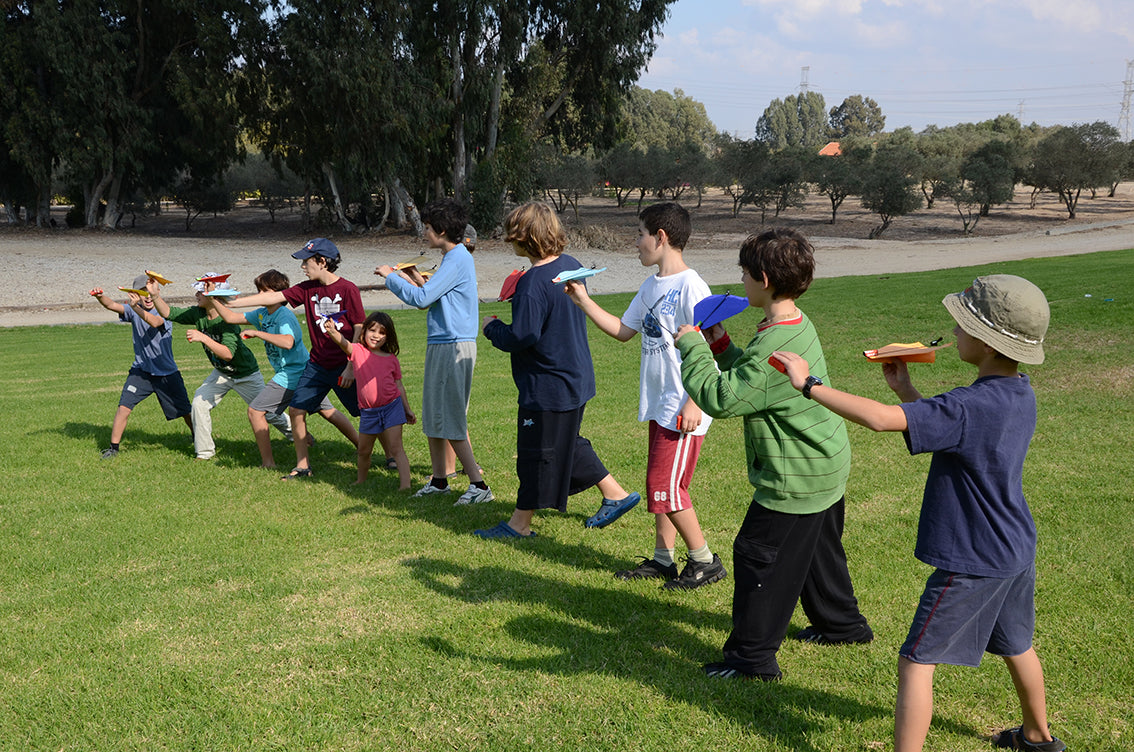FREE SHIPPING WW ON ORDERS OVER $99 USD
FREE SHIPPING WW ON ORDERS OVER $99 USD

Are you ready to make history? Imagine folding a simple piece of paper, tossing it into the air, and watching it soar further than any paper airplane has ever gone before. It sounds like a dream, right? But for those who dare to break records, that dream is closer to reality than you might think.
In this blog, we’re diving into the world of paper airplane record-breaking and showing you how to break the record for the longest paper airplane flight—a feat that requires more than just a good throw. Let's explore the record, the science behind it, and the best strategies to set a new world record
As of now, the official Guinness World Record for the longest paper airplane flight stands at an astonishing 69.14 meters (226 feet, 10 inches). This mind-blowing achievement was set by, a Japanese paper airplane enthusiast, in 2010 at the University of Tokyo. Toda’s plane flew more than the length of a football field!

But before you start folding, let’s take a moment to reflect on the sheer skill and science that went into that flight. Breaking this record requires precision, design expertise, and a strong understanding of aerodynamics.
You can't just fold any old paper airplane and expect it to fly the distance. The design you choose is critical to the success of your flight. Here are a few key design considerations for a world-record paper airplane:
The type of paper you use plays a huge role in the performance of your plane. Most record-breaking airplanes are made from **standard printer paper (8.5 x 11 inches)**, but the weight and thickness of the paper matter. Too heavy and the plane will struggle to stay airborne; too light and it may not fly far enough.
The general consensus among record-breakers is to use **80 gsm (grams per square meter)** paper, which is the standard weight of most printer paper. A thicker paper may create a sturdier plane, but it can also slow it down. Experiment with different types of paper to find the perfect balance between durability and flight efficiency.
The design of your paper airplane should focus on maximizing lift while minimizing drag. The most effective designs are sleek and symmetrical to ensure stability during flight. One of the most popular designs for long-distance paper airplanes is the “dart” style. It has a narrow, sharp nose and long, straight wings that reduce drag and allow the plane to glide smoothly.

However, don’t be afraid to experiment with variations! Some long-distance airplanes incorporate **wings with slight dihedral angles** (the upward bend at the tips) to improve stability.
It’s not just about the plane you build; it’s about how you throw it. The throw is crucial to achieving a record-breaking distance. The best technique is to aim for a smooth, controlled release with an emphasis on gliding rather than power. Here’s how to get it right:
Gripping the plane correctly can make all the difference. Hold the plane lightly at the center, near where the wings meet the body, and avoid squeezing the wings too tightly. A relaxed grip will allow for a more controlled release, making your plane less likely to veer off course mid-flight.
Perfecting the flight also means paying attention to the conditions in which you launch your paper airplane. Just like athletes who time their performance with the right weather, the environment can make or break your record attempt.

Believe it or not, temperature and humidity can also influence your paper airplane’s flight. Warmer, drier air tends to offer less resistance, allowing your plane to glide further. However, too much moisture in the air can cause the paper to become heavier, reducing the airplane’s flight efficiency.
Once you’ve designed your paper airplane and are confident in your throwing technique, it’s time to **test and adjust**. No record-breaking attempt is complete without refining your craft. Here’s what you should focus on during your test flights:
To break the record, you’ll need to achieve a consistently long flight. Practice several throws, making sure each launch is similar in terms of angle, speed, and power. The more consistent your throw, the better your chances of success.
When the moment finally comes to break the record, you’ll want to be fully prepared. Have a measuring tape and a camera ready to document the flight. Guinness World Records requires that a certified official be present to witness and verify the attempt, but you can always practice the throws leading up to your official attempt.
Remember: breaking a world record is about precision, patience, and perseverance. Even if you don’t break the record on your first try, keep refining your technique, experimenting with new designs, and learning from each flight. With dedication and a little luck, that world record could be yours!
Now that you know the steps involved in breaking the record for the longest paper airplane flight, it’s time to fold, throw, and watch your paper airplane soar to new heights. Whether you’re aiming to challenge Takuo Toda’s 69.14-meter mark or simply want to set your personal best, remember that the fun lies in the journey of discovery, science, and creativity.
So, what are you waiting for? Grab a piece of paper, start folding, and who knows—your name could be in the record books next!
---
Have you ever tried to break the longest paper airplane flight record? Share your experiences, tips, and results in the comments below, or tag us on Instagram, Facebook, YouTube, or TikTok with your best paper airplane launch! Let’s inspire a new generation of record-breakers! ✈️